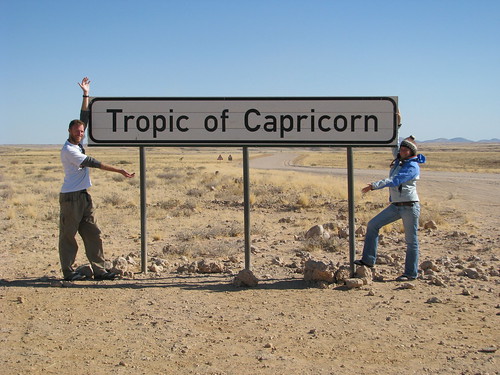[Editor's Note: Stick with me here, it
gets funny toward the end]
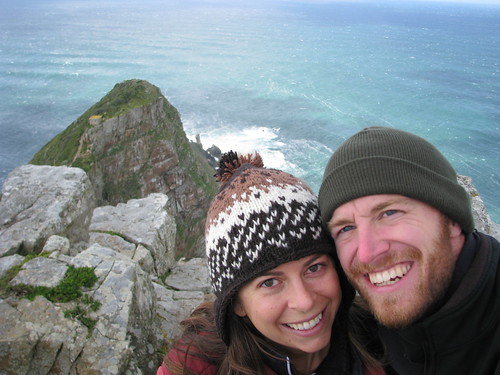
Our super-exciting, fast-paced
Africa-overland safari-adventure started with... two days in exactly
the same place where we already were.
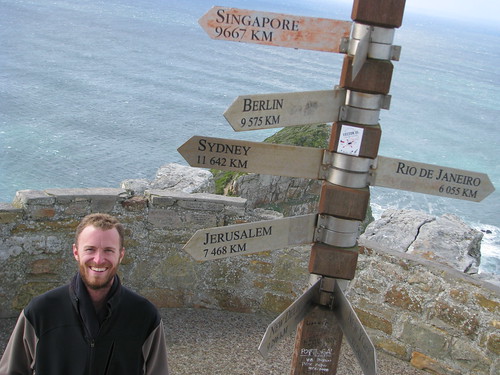
We met up with the group at a
guesthouse about half an hour south of Cape Town, four having flown
in that morning from Great Britain, four coming off a few days in
South Africa scuba diving with Great Whites, and one connecting from
a previous overland across ZA. All Brits. We got up early to make
the 9:30 meet time, which consisted of being told there would be a
briefing at 11:30 and then wine tasting after lunch.
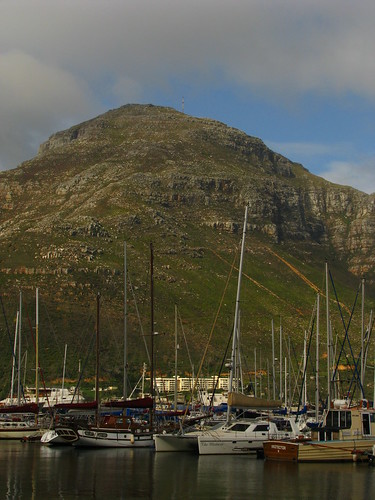
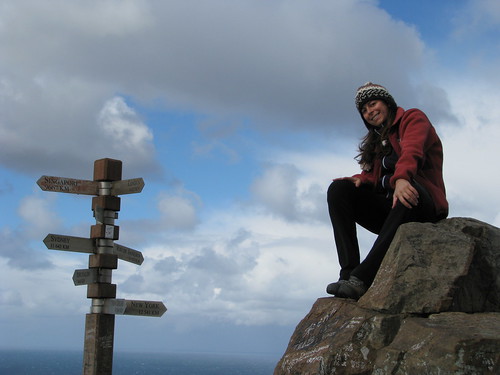
The next day was more ambitious, and we
went down to the Cape of Good Hope. Actually, not the southernmost
point in Africa, but the south-westernmost.

It is the demarkation
between the Indian and Atlantic Oceans, and anyone who thinks this is
purely cartographic convenience hasn't seen the way the currents
collide here.

The weather was four-seasons-in-one day.

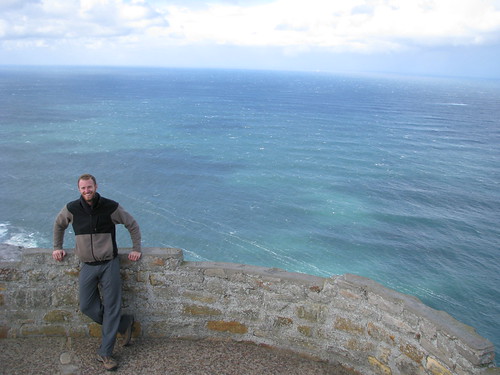
We got some
great photos with our new camera, and I managed another “Dangerous
Wild Animal Yelling at Lars” photo when this Baboon decided I was
taking too long to get the framing just so. Let me tell you when
they bark, they mean it!
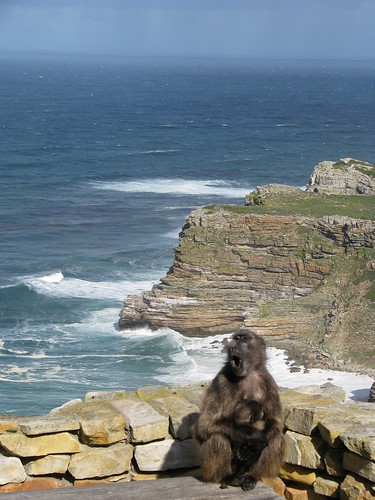
Next up was Table Mountain. We hoped
to take the cable car up to the top, but it was totally socked in.
The whole point is the view, so they close it when the weather turns
foul.
The “normal” format for this trip
is to start in Victoria Falls and end in Cape Town. Hence, two days
of relative R&R with some shopping stops for good measure. But
we're heading north, so we get the rest days at the beginning. Why
the “normal” direction is one way when you obviously have as many
South to North is beyond me (hello – one truck). Anyway, we had
our rest days, complete with private bathrooms and real beds. Too
bad, really. We could've used them later...
Susan: We also saw penguins! Here are some pictures --
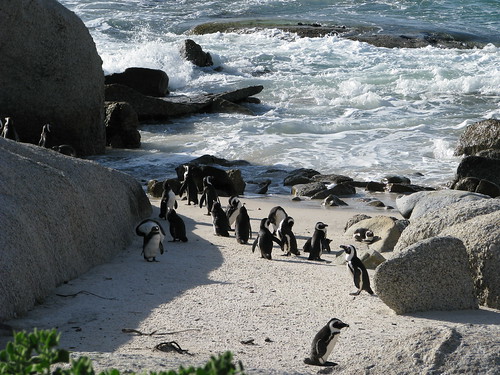

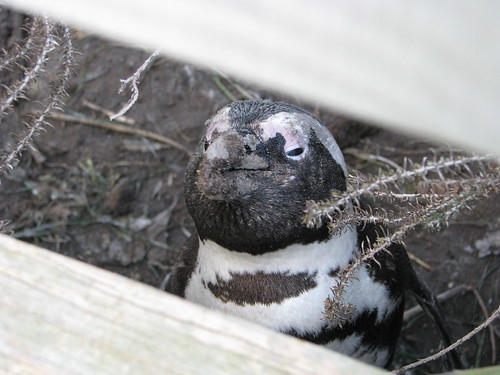
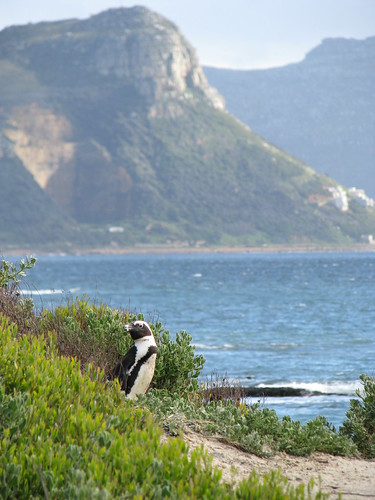
Day 3 was a long haul up the west side
of South Africa.
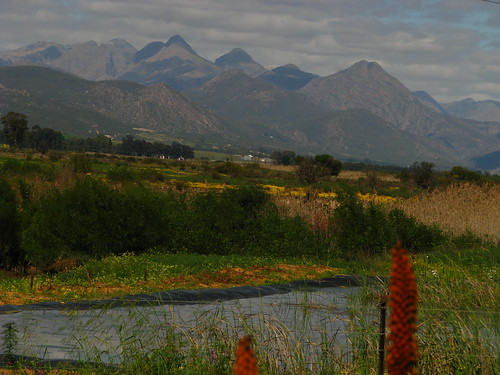
It's the wet season in this part of ZA, so the
scenery was very different from our earlier drive across the country.
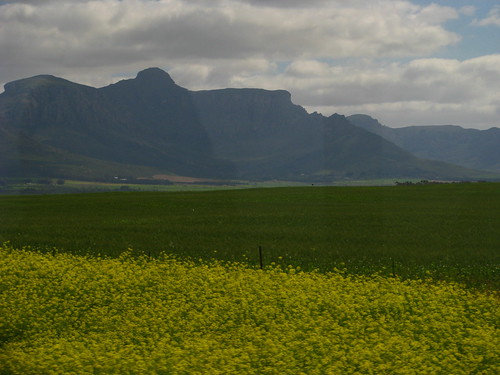
The wildflowers were in bloom and the route winds through verdant
agricultural areas.
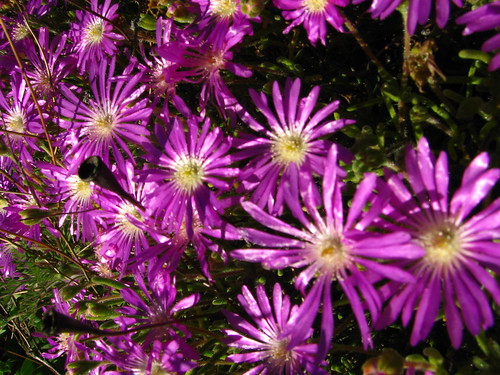
“Camp” was the backfield of a backpackers'
lodge nesteld among citrus trees.
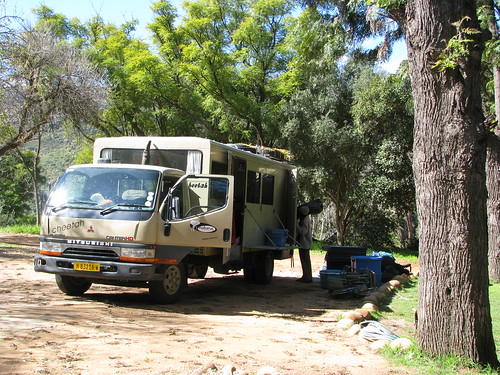
It was a little odd at first, I
think I was expecting something more “Yosemite Valley” but my
chagrin vanished once the sun went down. It got cold fast, and the
common area of the hostel had a fireplace. The group continued
getting to know each other as we ate dinner in front of the “bushman
television”.
A modest drive the next morning brought
us to a camp on the ZA side of the Namibian border. It was teeming
with other overland trucks – more companies than you can count.
This is apparently a popular route and a very popular way to see it.
The spot was pretty, right along the Orange River.
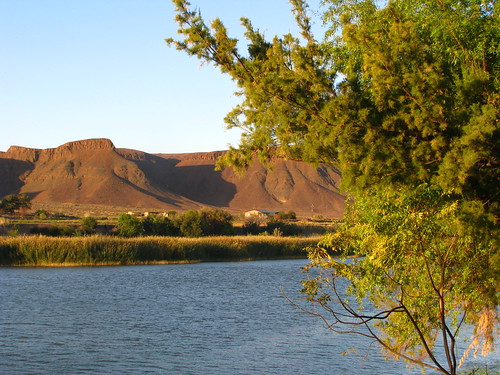
The next morning
we took some inflatable kayaks for a ride down the river –
“crocodile and hippo free since 1933”.
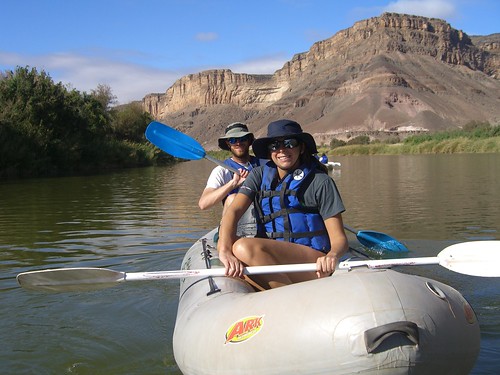
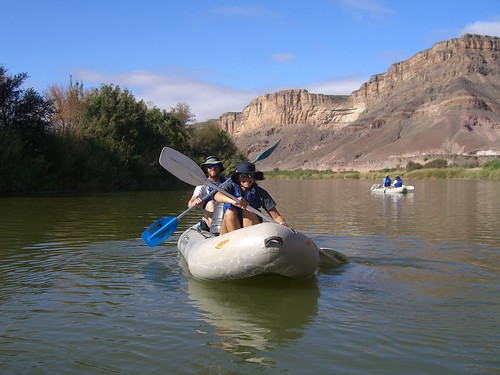
OK, actually I have no
idea since when, but they were all shot long ago and that rhymes. It
was... nice... but not brain-melting. Mostly calm and sort of
pretty.
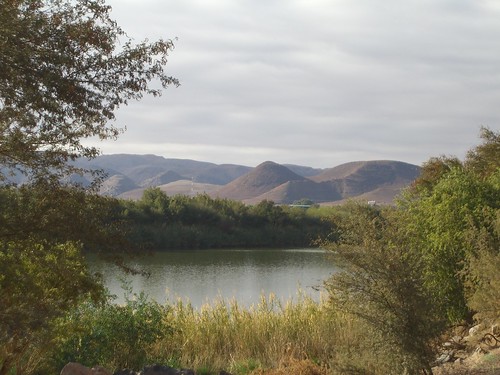
Really, that was sort of the whole
thing so far. The first few days were consumed with “just getting
there” and breaking up the haul into manageable rides. But that
night we'd see sunset over “Fish River Canyon” in Namibia. It's
the second largest after the Grand Canyon.
Susan did a little celebration dance
after we cleared Namibian customs (oh wait, she just needed to pee,
nevermind) but we smiled at yet another exotic passport stamp. We
piled back into the truck and I braced myself for what are supposed
to be the “inferior roads of Namibia” which, unlike South Africa,
are mostly unpaved. I was prepared for the worst. Namibia is a very
poor country, almost completely desert, so everyone has to scrape a
living out of the rocky, sandy soil and few sources of permanent
water. I'd also read in at least one guidebook that Namibia had some
of the worst loos in the known world.
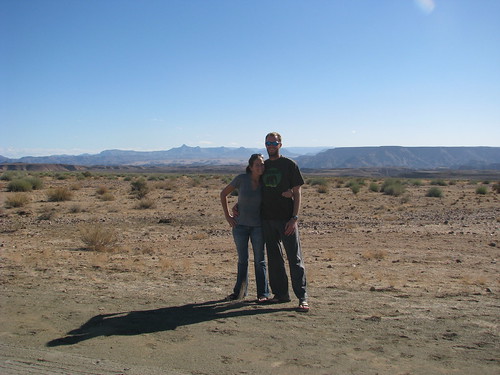
The road turned out to be quite good,
in fact everything in Namibia turned out to be quite good. Every
preconception I had was dispelled, and most of what I had been told
to expect was flat wrong. We spent roughly two weeks here, and I
gotta say, Namibia has it's shit together. I'm sure they are still
poor, statistically, and that the incoming wealth is slow to trickle
through the population. However, signs of economic development were
abundant; a bustling tourist industry in Swakopmund, new developments
of vacation homes for South Africans along the coast, the roads were
always in good shape, even unpaved roads seemed to get regular
scraping to keep them smooth. You can always drink the tap water, as
the government has an aggressive program of water quality regulation
and testing. The cities were clean, dusty of course, but litter
free. And the loos were universally better than you would expect
from their peers in the States. That last one isn't so much Namibia
as most of the world, come to think of it. The toilets in the US
tend to be pretty dicey... anyway, Namibia was a joy to travel in.
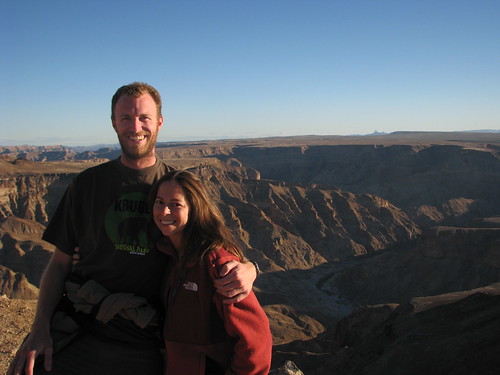
But I'm getting ahead of myself here
and skipping the telling of sunset over Fish River Canyon.
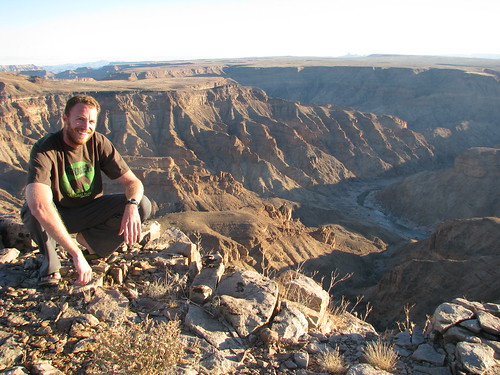
Honestly,
and I hate to say this, I am skipping it because it is skippable.
The Canyon is pretty, and the sunsets in Namibia are always
spectacular (it's all that dust), but if you've been to the Grand
Canyon this one just ain't gonna impress.
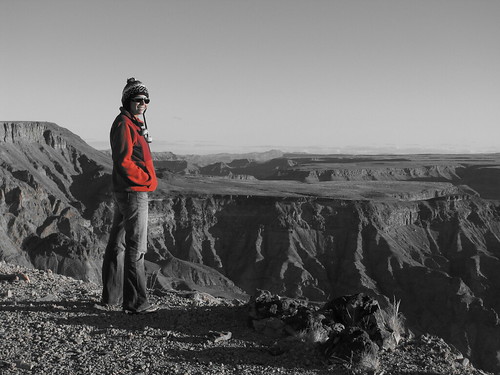
I feel kind of bad writing this. Five
days into our trip now, and I'm sort of unimpressed. OK, the
wildflowers were pretty, the sunsets are to die for, but we've driven
something over 1,000 kilometers and spent 25% of our (rather
expensive) trip and so far we've done some ho-hum kayaking and one
“really spectacular world heritage site” that is disappointing.
But to be honest, it might have been the cold.
We thought we were prepared. We still
have most of the clothes we used to keep warm in Mongolia, for
Christ's sake. Also, we bought sleeping bags (rated to 0-degrees
Celcius) in Cape Town specifically for this part of the trip. We
also still have our sleeping bag liners, so some
not-even-freezing-temperatures nights should be no problem, right?
Maybe it's the contrast. It is winter (August in the Southern
Hemisphere) but the days are warm, hot even. There was some chill in
Cape Town when the sky was cloudy, but since then it's been warmer.
But every night it gets cold - really, really cold. And we're
camping. In tents. Not sleeping has a habit of messing with your
gumption levels the next day.
I was actually faring much better than
Susan, who, specifically because it is a huge pain in the ass to get
up and pee in the middle of the night, couldn't help but get up to
pee in the middle of the night. An evening beer was a quick casualty
of this, but by the end of our trip Susan would hardly drink water
after 5. It's a cruel psychological trick that when you have a nice
warm bed to come back to, and a private loo five feet away you sleep
10 hours, but if you have to put on clothes, get out of your sleeping
bag, unzip the tent, climb out, rezip the tent, walk across a dark
campground and then reverse the whole process, you need to pee every
five seconds. Then you are stuck, back in you sleeping bag, waiting
to warm it back up so you can get to sleep again, only to get woken
by the guy zipping open the tent next to you.

We weren't the only ones, and Clive,
our poor henpecked guide, was greeted by a daily barrage of “is the
next campsite warmer?”
From Fish River Canyon we drove to
Sussusvlei. This tongue twister is the gateway to the magnificent
dunes of Namibia.
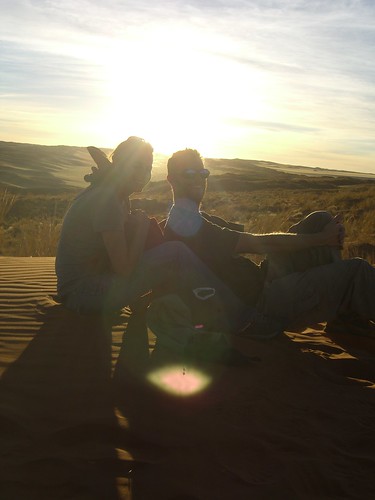
The campsites were charming numbers contained by
low stone walls and huddled under huge trees planted for shade in the
otherwise open grassland. The tall grass was dry, and the view gave
that same feeling you get driving by wheatfields when you think you
could just stick out your hand and pass it over the tops and it would
feel like soft fur. The area was nestled between jagged mountains on
one side, and the red-sand dunes on the other. It never rains, but
once a year water flows from inland and floods the area. A short
burst of activity and growth is proceeded by 11 months of dry
dorrmancy.
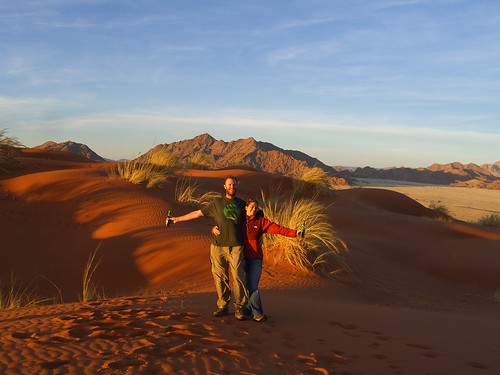
Before sunset we climbed a dune near
the campsite. The sand changed color with the fading light, covering
the spectrum from orange to red to purple.
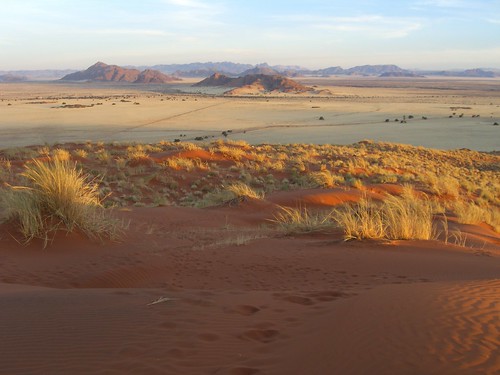
This is the oldest desert
in the world, 80 million years or more. The wind blows inland in the
morning and out to sea in the evening. The constant grinding of the
dunes under the shifting wind makes the desert sands the finest in
the world, with a consistency more like dust than what a California
beachgoer would think of as sand.
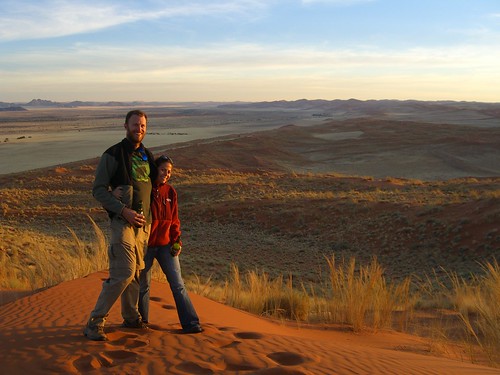
This makes climbing difficult, and
also fills your shoes. We thought we had poured it all out after the
walk, but the tiny grains had gotten in through the little holes in
the mesh and my shoes were stufffed with sand between the layers of
construction. In Cairo, weeks later, I would still be working out
small handfuls of sand.
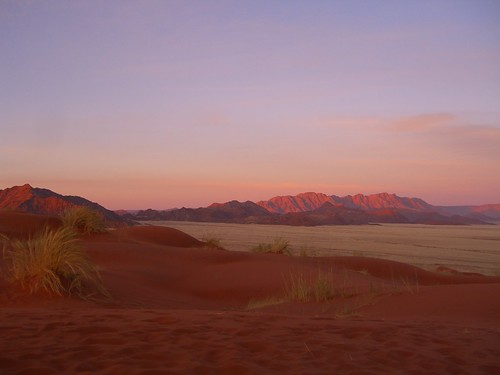
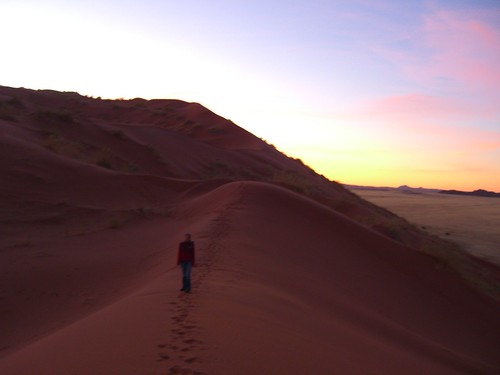
In Soussusvlei, finally, was an
experience worthy of the hype. The view from the top of the dune was
spectacular, as now we looked down on the grassland and could see the
textures left by last flood, a thousand feet below us. Behind us
the jagged mountains rose up, their faces scoured by eons of wind,
but never any water. Our dune was the first in a long line,
stretching 130 kilometers to the sea.
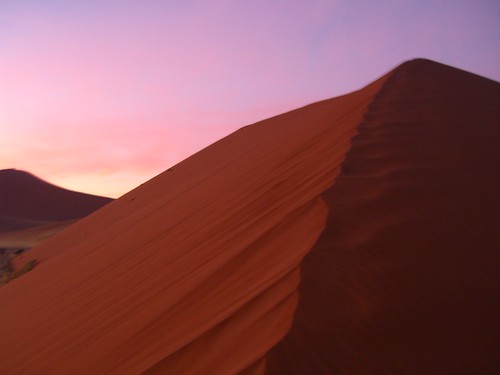
Not satisfied with one existential
experience, we woke the next morning at some ungodly hour to make the
drive out to Dune 45 in time to climb it and watch the sunrise. Our
departure was delayed by one of the other campers, and the driver did
his damndest to make up the time en route. I don't know if you've
ever driven 160 km/hr or not but I'm sure you haven't done it in a
huge safari truck on unpaved desert roads. The excitement was mixed
with watching the lightening sky out the windows as the desert slowly
acquired color, like a slow motion tale of Genesis; “Let there be
Light!”
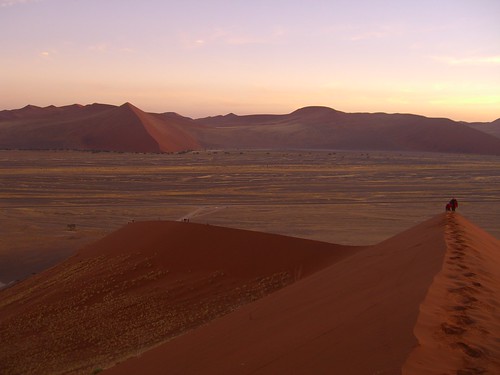
Fortunately, we did make it to the dune
in time, and Susan and I were at the top before the sun broke over
the horizon.

I was the first up, and could snap some photos of the
perfect, untrod line of sand made by the night's winds.
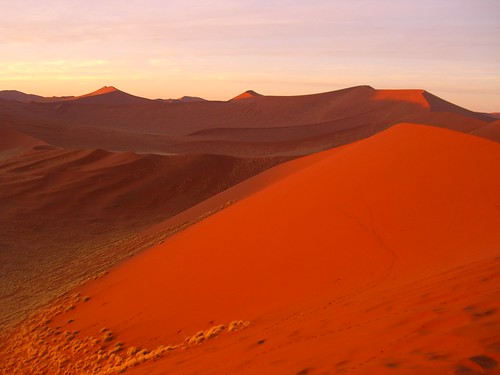
The air was
warming already, and the dunes were giving up the little bit of
moisture that had accumulated as dew. Mists hung just over the
curves, slowly becoming like halos ringing the larger dunes before
the winds picked up. They briefly hung over the dunes in perfect
visual echos of their shape before evaporating completely and
vanishing altogether.
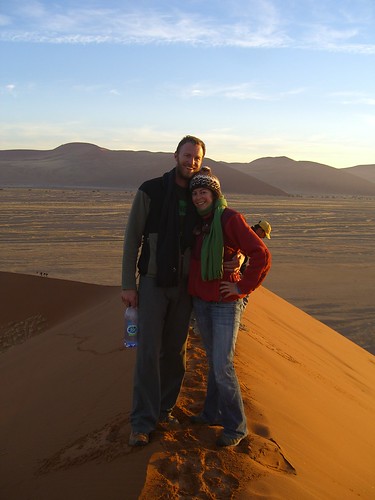
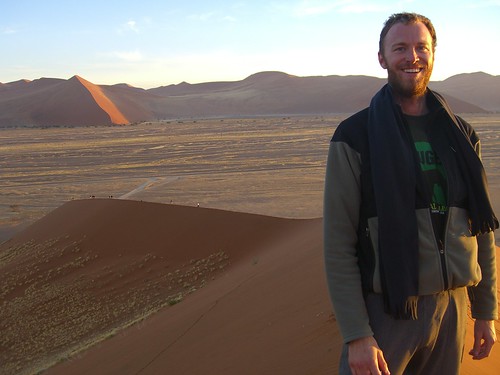
After taking a ridiculous number of
photos, knowing they could never really capture the view we sprinted
down the steepest part of the sand, a thrilling drop of 1000 feet in
a few seconds.
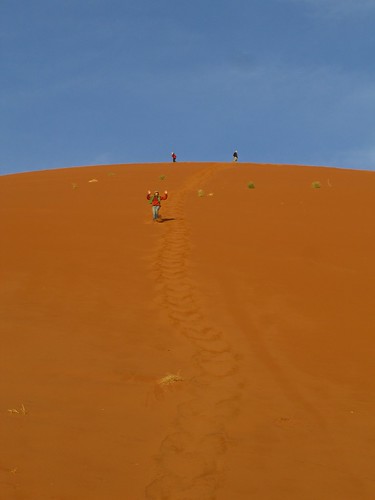
The colors continued to shift as we ate breakfast and
then drove deeper into the wilderness for a short hike. We spooked
away a herd of springbok, who sprinted off before I could capture
them on film, and saw lots of spoor; of snakes, antelope, lizards.
Testaments to the rich wildlife in what at first glance seems a
beautiful, but desolate landscape. We contemplated the ingenuity of
life as we alternately watched ants at work and looked out across the
completely motionless dry lakebed.
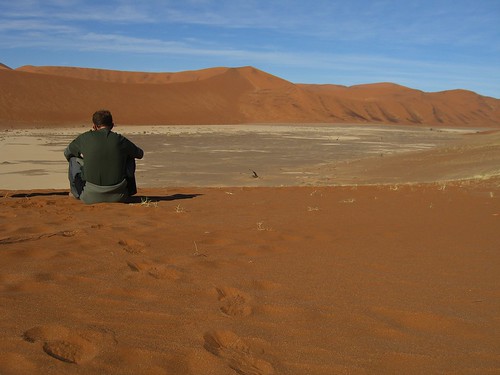
This was about the time the damn kids
started to get to me.
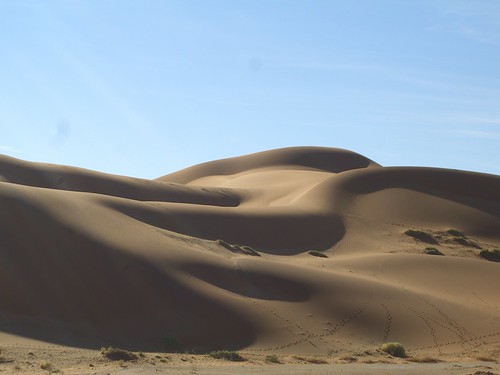
Of the eleven tourists on our trip,
four were travelling together. Evan (late 40s?), the
not-actually-father of Hannah (21) was squiring her and two friends,
Becky (24) and Shereen(21). Like any young girls suffering from
arrested development, they were constantly talking about nothing.
Yap, yap yap, all day long from the seat behind us on the truck.
Fortunately, while their brains were stuck in their teens, their
voices had matured and we were spared the squeals of real teenagers.
I'd gotten pretty good at tuning them out. Occasionally they would
put in their ipod earbuds, and even from 4 feet away I was treated to
the melodically-challenged brit pop of today, but this too, I'd
gotten pretty good at tuning out.
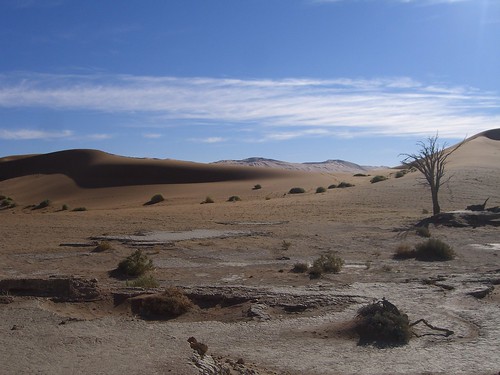
But here we were, a few hours after
dawn, an hour hike from the end of an hour-plus drive from a remote
camp days away from the nearest airport, a full days airline journey
from Europe, surrounded by the glories of nature, in the oldest
desert on earth, immersed in the wonders of nature that fights to
scratch out an existence in such a harsh place. The wind murmurs and
groans as the winds rise and die under the warming desert sun - And
they didn't shut up. Not once. Not even to breathe. Yap, yap, yap.
I think they were talking about their gym. Not some intimate
whisper about the humbling power of this place, or a contemplation of
the eternal, nor a breathless question about the existence of a
creator. The gym. It definitely messed with my mojo.
When we got up to walk back they were
silenced, finally, not by the exertion of walking on the sand, but by
the ritual injection of ipod buds to their ears. Then, and I am not
making this up, Shereen asks “So, are we in Namibia then?”
I weep for the future.
Later, we had a brief visit to a nearby
slot canyon, which was nifty, but nothing to compare to Zion. It was
impressive to still find water (and Jackal tracks) in what was by
this time of day a very hot and dry environment.

Camp was a little nothing place en
route, but with a fabulous sunset. One of the best I've ever seen.
The bands of color in the sky stretched almost all the way back to
meet again behind us in the Eastern sky, and encompassed every known
hue, even a ghostly green that I have never seen before in an evening
sky. The next day we were off for Swakopmund; a real bed, our own
showers, and a chance to buy extra blankets. Plus, the best best
thing to Snowboarding in August for invoking the envy of my buddies
back home – Sandboarding! (stay tuned)
